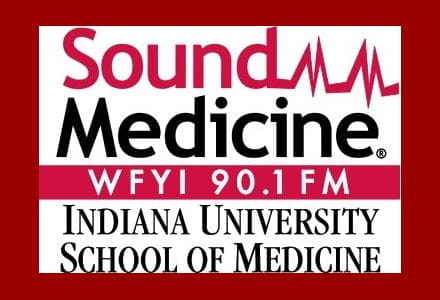INDIANAPOLIS — The award-winning “Sound Medicine” announces its program for March 10, featuring several segments on the cost of health care, an innovative neurofibromatosis study, and the signs of alcohol abuse. Please check local listings for broadcast dates, times and stations.
“Sound Medicine” covers controversial ethics topics, breakthrough research studies and the day-to-day application of recent advancements in medicine. It’s also available via podcast and Stitcher Radio for mobile phones and iPads and posts updates on Facebook and Twitter.
A bitter pill to swallow: Steven Brill, journalist, knows health care. Brill’s latest article, ‘Why Medical Bills are Killing Us,’ is the cover story for the March 4, 2013 edition of Time magazine and the longest story ever to be published in Time. Brill spent months poring over and analyzing medical records, and his findings are fascinating. Many hospitals charge $1.50 for acetaminophen, a generic version of Tylenol, when consumers can buy over 100 of these generic pills for the same price at the drug store. Although $1.50 may not seem very costly, does $15,000 for routine blood work sound high? For cancer patients the cost may be even higher as many hospitals charge mark-ups in excess of 400% for cancer treatments. In this special segment Sound Medicine’s Aaron Carroll, M.D., speaks with Stephen Brill about how health care is costing us.
Aspirin resistance or ‘pseudo-resistance’? Around one-fifth of Americans take some form of low dose aspirin daily for its heart healthy benefits and it’s believed that up to one-third of these patients are aspirin resistant. Tilo Grosser, M.D., is the author of a new study that concludes many diagnoses of aspirin resistance are actually false, a condition known as pseudo-resistance. According to Dr. Grosser, many low-dose aspirin tablets are coated to prevent damage to the stomach. However. Dr. Grosser’s study finds that this coating may actually cause a false diagnosis of aspirin resistance. The study of 400 patients found that less than 0.25 percent of the subjects were actually aspirin resistant. Dr. Grosser is a research assistant professor of pharmacology, at the University Of Pennsylvania Perelman School Of Medicine.
Doc chat: Diagnosing alcohol abuse: Sound Medicine’s Barbara Lewis speaks with David Crabb, M.D., chair of the IU Department of Medicine, about the signs of alcohol abuse. According to a new study conducted by the University of Missouri, Columbia, primary care providers are missing the signs of alcohol abuse in up to 70 percent of patients by not using a screening tool that could help detect alcohol abuse among their patients. Screening tools are typically questionnaires with a variety of different questions. Dr. Crabb discusses the types and effectiveness of screening tools recommended by the study.
Are We Making Headway Against Neurofibromatosis? Kent Robertson, M.D., Ph.D., associate director of pediatric stem cell transplantation and assistant professor for the Department of Pediatrics, Indiana University School of Medicine, conducted a ground breaking new study that could change the outlook for neurofibromatosis sufferers. Neurofibromatosis is a disease caused by a single genetic mutation that causes life-threatening tumors in children. The tumors are slow growing, unresponsive to chemotherapy and radiation, and almost always grow close to vital organs. In a study conducted by Dr. Robertson, 23 patients received the drug Gleevec. After six months of treatment five patients had one or more tumors reduce in size. Although the study conducted was small, Dr. Roberson believes this treatment will eventually bring relief to those suffering from neurofibromatosis.
Grace Notes #21: Kindness: Sound Medicine’s Dr. Larry Cripe shares a meditation about the patient who taught him the value of simple kindness.
“Sound Medicine,” co-produced by the IU School of Medicine and WFYI Public Radio (90.1 FM) and underwritten in part by Indiana University-Purdue University Indianapolis, is aired on the following Indiana public radio stations: WBSB (Anderson, 89.5 FM), WFIU (Bloomington, 103.7 FM; Columbus, 100.7 FM; Kokomo, 106.1 FM; Terre Haute, 95.1 FM), WNDY (Crawfordsville, 91.3 FM), WVPE (Elkhart/South Bend, 88.1 FM), WNIN (Evansville, 88.3 FM), WBOI (Fort Wayne, 89.1 FM), WFCI (Franklin, 89.5 FM), WBSH (Hagerstown/New Castle, 91.1 FM), WFYI (Indianapolis), WBSW (Marion, 90.9 FM), WBST (Muncie, 92.1 FM), WBSJ (Portland, 91.7 FM), WLPR (Lake County, 89.1 FM) and WBAA (West Lafayette, 101.3 FM).
“Sound Medicine” is also broadcast on these public radio stations across the country: KSKA (Anchorage, Alaska), KTNA (Talkeetna, Alaska), KUHB (Pribilof Islands, Alaska), KUAF (Fayetteville and Fort Smith, Ark.), KIDE (Hoopa Valley, Calif.), KRCC (Colorado Springs, Colo.), KEDM (Monroe, La.), WCMU (Mount Pleasant, Mich.), WCNY and WRVO-1 (Syracuse, N.Y.), KMHA (Four Bears, N.D.), WYSU (Youngstown, Ohio), KPOV (Bend, Ore.) and KEOS (College Station, Texas).




